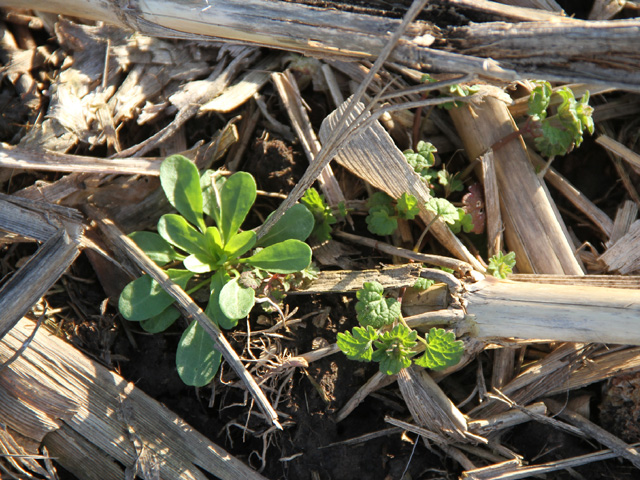Herbicide Shortage Workarounds
Weed Control Workarounds for Herbicide Shortages
ROCKVILLE, Md. (DTN) -- Chemical shortages and price spikes are complicating weed control for farmers this fall and next spring.
Fortunately, university weed scientists have been working to help farmers create weed control programs that work around shortages of key herbicides such as glyphosate, glufosinate (Liberty) and 2,4-D. We've pulled together these pieces here, for quick reference.
FALL WEED CONTROL WITHOUT GLYPHOSATE
Perhaps the biggest challenge for many growers tackling fall burndowns and looking ahead to spring burndowns is the prospect of farming without glyphosate -- the country's most commonly used herbicide.
Ohio State University weed scientist Mark Loux jumped on this topic early. Loux's two-part series, "Life in a Time of Glyphosate Scarcity," focuses first on weed control in no-till wheat and then more generally on fall burndowns. He discusses rate lowering, as well as alternative herbicide options, such as dicamba, metribuzin or simazine and certain ALS herbicides. See both stories here: https://agcrops.osu.edu/… and here: https://agcrops.osu.edu/….
This past Ohio State University article on fall-applied herbicides also lists non-glyphosate options, Loux noted. See it here: https://agcrops.osu.edu/….
P[L1] D[0x0] M[300x250] OOP[F] ADUNIT[] T[]
FALL WEED CONTROL WITHOUT 2,4-D
Many of the recommendations for weed control without glyphosate fall back on 2,4-D, a growth regulator that some growers are also reporting are in short supply.
OSU's Loux comes to the rescue again here, with an article on how farmers can wrangle fall weed control without 2,4-D. Many growers will try to pivot to another growth regulator, dicamba, Loux noted. His article hits on some troubleshooting tips, including dicamba's limited cold weather abilities, weed spectrum and best tank mix partners.
See it here: https://agcrops.osu.edu/….
FALL AND SPRING WEED CONTROL WITHOUT GLYPHOSATE AND GLUFOSINATE
A team of Purdue University scientists -- weed scientists Bill Johnson and Bryan Young and doctoral student Marcelo Zimmer -- penned an even longer, overarching piece on how to control fall and spring weeds without easy, affordable access to glyphosate and glufosinate (Liberty). The article will be especially useful to no-till growers, who rely heavily on chemical controls in lieu of tillage.
The group outlines several scenarios for no-till corn and soybean fields, fighting a spectrum of weeds, from grass pressures to winter annual weeds to later-emerging pigweeds and horseweed. They also touch on cover crop mixes that can suppress weeds ahead of corn or soybean crops.
See the article here: https://extension.entm.purdue.edu/….
COVER CROP TERMINATION WITHOUT GLYPHOSATE
Cover crops are an increasingly popular option for outcompeting weeds and suppressing their emergence before spring-planted crops. But at some point, the covers must be terminated, the Purdue team of scientists point out -- and glyphosate has long been a top choice for this task for popular covers such as cereal rye and annual ryegrass.
In yet another university article, the Purdue scientists outline some options for tackling those grassy covers with limited glyphosate supply, under different termination timing scenarios.
The article also covers the basics of terminating other covers, such as legumes and brassicas, while also targeting summer annual weeds. And finally, it covers non-chemical termination options, such as crimping or mowing. See it here: https://extension.entm.purdue.edu/….
Emily Unglesbee can be reached at Emily.unglesbee@dtn.com
Follow her on Twitter @Emily_Unglesbee
(c) Copyright 2021 DTN, LLC. All rights reserved.






